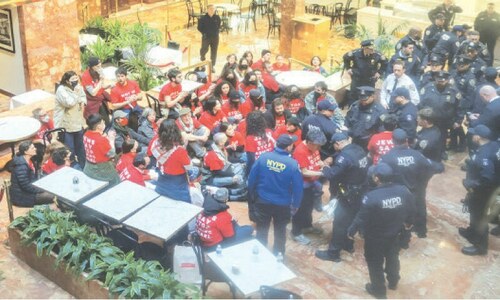What percentage of the total population is Muslim? This was a question in a recent UK poll. The average number calculated from the replies given by respondents was 21 per cent. The actual figure is 5pc. This ignorance was even worse in the United States where people think Muslims make up 15pc of its total population when it’s only one per cent.
The situation in France is even worse: people think 31pc of its population are Muslims when the figure is actually 8pc.
So what makes people overestimate the number of Muslims in their midst so wildly? While respondents in the opinion poll were also off the mark when it came to guessing the total number of immigrants as a percentage of the population, the difference between reality and their estimates was not as wide.
It would appear that the bigger the figure for Muslims in a person’s mind, the greater his discomfort at their presence. Over the years, a number of factors have fed into an anti-Muslim prejudice and perceptions.
Firstly, Muslims in the West form a very visible community as a majority of the women wear traditional clothing, with many opting for either the full niqab or a headscarf; young men often grow beards. They thus stand out in a way other communities don’t.
The community also preserves its cultural and religious practices by not going to pubs with colleagues and neighbours, and insisting on halal meat. Then there are many horror stories in the media about forced marriages and honour killings that take place in Muslim communities.
After the famous fatwa against Salman Rushdie and the worldwide riots over the Danish newspaper cartoons, Muslims are also seen as violent and humourless people who cannot abide criticism of their faith, even in fiction. Reports about non-Muslims persecuted and even killed under the blasphemy laws reinforce this perception of an intolerant community.
People in the UK were appalled when Mohammed Asghar, a 70-year-old British citizen with a known history of mental illness, was condemned to death for alleged blasphemy. In a newspaper interview, his daughter expressed her rage over the fact that he had been shot while in jail.
Even more damaging to the image of Muslims in Britain have been the widely covered reports about gangs of mostly Pakistanis who have been preying on vulnerable young girls for years. While the dictates of political correctness have prevented many here from openly viewing this in purely Muslim/Pakistani terms, there is little doubt that these horrifying events in towns like Rotherham and Rochdale have only reinforced existing prejudices.
Perveen Qureshi, director of the United Multicultural Centre in Rotherham, talked to the media about how Muslim community elders hushed up the scandal instead of going to the police. Britain was shocked and enraged to find out that over a 16-year period, around 1,400 young girls had been brutally exploited by a gang of Muslim men.
A report prepared by Ann Coffey, a Labour MP and a social worker, termed the sexual exploitation of the young in the Greater Manchester a ‘social norm’. Police, parents and social workers interviewed in the wake of this report were of the view that this was a nationwide problem, and it is only now that the police are taking it up seriously and arresting and prosecuting those involved.
Earlier, the police failed to take allegations seriously as they thought that in many cases, the young girls were ‘asking for it’ by their clothing and behaviour. Often, the victims were under care, and their supposed carers ignored their plight.
Such girls, some of them as young as 12, were tempted by the gifts lavished on them by cynical adults who then raped them and literally passed them around.
Although many non-Muslims have also committed similar crimes, in the public’s perception, it is Muslims — and specially Pakistanis — who prey on vulnerable young white girls.
And of course, the fear of home-grown terrorism is ever-present. Hardly a month passes without some plot being uncovered. Currently, the concern is about young Muslim radicals going off to Syria to fight with extremist groups like Al-Nusra and the Islamic State, and then returning to launch attacks in the UK.
Events in the Middle East also contribute to this Islamophobia: when two British aid workers were beheaded by the Islamic State, the videos of their vicious decapitation sent a wave of anger and revulsion across Britain. Although many Muslim clerics in the UK have condemned the acts, the fact that hundreds of young British Muslims have opted to be on the same side as these jihadists has turned a large section of public against the community.
All these fears and prejudices have combined to form a very negative image of Muslims in Britain. But things are much worse in France and Holland where legislation targeting Muslim attire has been passed. It would seem that as attitudes harden, this will be the trend for the future.
Steadily, openly anti-Muslim voices have gained respectability and support. Bat Ye’or’s ‘Eurabia’ concept has gained traction on the right, with figures like the Dutch politician Geert Wilders attracting a growing audience for his virulently anti-Islam diatribes. In Britain, a liberal, tolerant majority has prevented extreme Islamophobia from going mainstream as it has done in France.
The focus in the UK is immigration from EU member countries which has shot up in recent years. This has given rise to the UK Independence Party which is now threatening the dominance of the three major parliamentary parties. But question marks about the Muslim community remain.
Published in Dawn, November 3rd, 2014














































